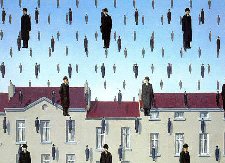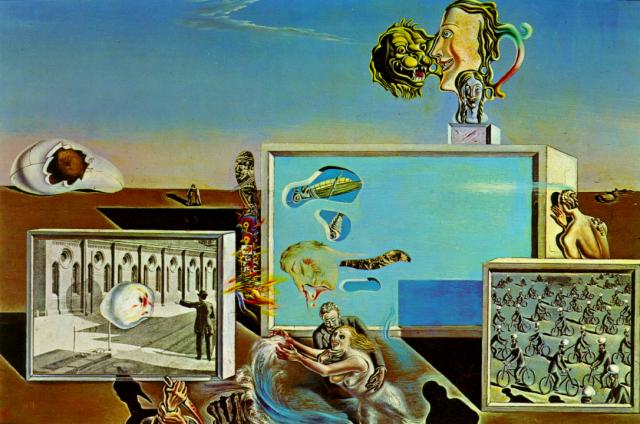 One of the reasons for the success of Facebook is that friends are supposed to be such. Usually, in social networks and dating sites we meet people who are alien to our real-life narratives. Even though these “just online” contacts can bring interesting connections, in most cases such “friends” come and go and the connection doesn’t go much in depth. Missing a real-life narrative beyond the Net, the connection between people doesn’t sink as deep as in an authentic and almost “organic” place.
One of the reasons for the success of Facebook is that friends are supposed to be such. Usually, in social networks and dating sites we meet people who are alien to our real-life narratives. Even though these “just online” contacts can bring interesting connections, in most cases such “friends” come and go and the connection doesn’t go much in depth. Missing a real-life narrative beyond the Net, the connection between people doesn’t sink as deep as in an authentic and almost “organic” place.
So Facebook came to the rescue as a way to connect with people we know and those we knew in the past but with whom we lost touch. Even though the invitation game of picking friends and friends of friends expands and I ended up with some contacts I barely know, with maybe half of them I shared important parts of my life, parts of our histories which shaped our lives.
But I am resistant to participating in Facebook games with them, for the very reason that some of them are real friends and we had such important connections. So until now I didn’t look for friends to add on Facebook and I seldom open the site, not much more than accepting the requests I had until now.
Since most of the people who request for friendship know I’m a long-time Internet user and former Internet book publisher, sometimes I feel like telling them that I rarely go to Facebook and I’m not deliberately ignoring them. Actually, the situation poses an inner strife, a sort of double bind: since people are there on the site, it doesn’t look nice ignoring them, but at the same time I don’t want to be engaged further in one more online toy.
Of course, we can say that for every level of communication there are different areas and that we can choose the medium according to the depth and intimacy we need. With intimate people I can choose other ways too for communicating. The medium can vary greatly from telephone calls to personal meetings and body/mind contacts at any level from hand-shaking to making love.
But Facebook, like many other Web applications, tends to expand its scope and include more aspects of our lives, and can also easily become addictive. It starts with a cool way to connect, then it adds feature after feature, then it becomes essential to not get isolated from the group of friends and, finally becomes one more window that feeds on our time and scant attention. In being active much on Facebook I sense the risk of digitalizing even those real and important relationships and consequently of trivializing our rich histories. I also sense the risk of creating a cyber-elite and excluding friends who aren’t on the Internet or who access the Net quite rarely, friends who don’t have the time or the desire to get wired or locked in social networks.
Even though I have, at the moment of writing, 45 friends on Facebook, a small number compared to most users (around 150 friends on average), anytime I connect to the site I can still get a certain number of updates about “What they are doing now.” As I browse through those short sentences, my online experience, like that of many other people, is made up of other open Web pages and applications competing for my attention. While one friend is planning a trip, another is going to sleep, one more is sad (even though “negative” feelings aren’t expressed that much, generally speaking) and yet another is enjoying music. It seems to me to be more like TV, where tragic news are immediately followed by gossip and vice versa, where everything melts in an anesthetized flow of news with no connection with our inner states.
I don’t want to become numb in the felt connection with my friends as I might be with a TV or movie character. Every input we get from a person who is a valuable connection for us takes time and attention to assimilate and interact with, especially if it’s something which isn’t trivial. But time and attention are scarce resources when we are on the Net and depth is mostly avoided. Perhaps this is the reason why we read much less about difficult and challenging inner states on Facebook and in general on other social networks. The “hugs and love sending” applications look a bit, well…unsatisfactory.
I sense as well the risk of considering myself exempt by keeping more direct contacts with people, substituting them with writing a few updates about myself on Facebook. Even in this case, we could say that one medium doesn’t have to substitute another, but our time and attention resourses are limited and don’t grow at the pace of computer speed.
One other risk I sense is to homogenize the rich variety of ways with which I interact with individual persons. With every friend whom I interact with in an open way, a unique relationship is being created, almost an entity in itself, shaped in time from the alchemy of two souls meeting.
On a psychological level we can say those are object relationships, which drive us in the construction of our personalities. People who follow a spiritual path make themselves aware of the role of those relationships in their lives and eventually they can be transformed, making either the relationship evolving in a more authentic way, free from past conditionings, or eventually end it.
Homogenizing our relationships and canalizing them through Web applications and options weakens the construction of our personality through object relationships and doesn’t help us in becoming aware of them either.
One other resistance I have in meeting people on Facebook whom I knew a long time ago is about the recognition that what shaped our relationship is not there any more, since we’ve probably both evolved our personalities in different directions. And it isn’t easy to find a new point of contact through Facebook which fits our current inner states. At the same time, we can’t just re-enact the past: once our psyche has evolved, going back to the same shape becomes impossible, like growing baby teeth back again.
In the meanwhile, I rediscovered plain old email communication, which was the only way to communicate when I started working online 15 years ago. From time to time I email updates about my life to a group of friends who are more present in my life. Email is simple and more environment-friendly, uses little bandwidth, and is accessible from any computer, even very old ones, by very slow Internet connections and by most mobile phones too. Facebook pages usually take a long time to show if the Internet connection is not fast. Email is more direct and personal, giving almost the feeling of letters.
The lack of gimmickry in email writing gives space to more direct connections between words and internal states: we need to fill words from the inside, rather than choosing applications or giving a quick update about “What I am doing now.”
However, I sense that a part of my resistance toward participating in Facebook is also to be found inside some of my conditionings and beliefs which don’t match with reality. I want to explore them for the sake of knowing those parts of myself, so I’ll probably start to participate more in the games to see where it takes me.
See also:
Facebook and the sorcerer’s apprentice of the Net
I click, therefore I am: Toward outsourcing our identity
Unlinking ourselves through technology
 Una delle ragioni del successo di Facebook è che si suppone che gli amici siano tali. Generalmente nei social network e nei siti di incontri si contattano persone che sono estranee alla narrativa della nostra vita reale. Anche se i contatti che avvengono solamente online possono portare ad interessanti connessioni, nel più dei casi tali “amici” vanno e vengono, la relazione non va molto in profondità e non scende in un luogo autentico e quasi “organico”.
Una delle ragioni del successo di Facebook è che si suppone che gli amici siano tali. Generalmente nei social network e nei siti di incontri si contattano persone che sono estranee alla narrativa della nostra vita reale. Anche se i contatti che avvengono solamente online possono portare ad interessanti connessioni, nel più dei casi tali “amici” vanno e vengono, la relazione non va molto in profondità e non scende in un luogo autentico e quasi “organico”.
Quindi Facebook è arrivato in soccorso come modo per connettersi con persone che conosciamo e con coloro che conoscevamo nel passato ma con cui abbiamo perso i contatti. Anche se il gioco degli inviti e degli amici degli amici si espande e si finisce con dei contatti che si conosce a malapena, con forse una buona metà delle persone ho condiviso importanti parti della vita, parti della nostra storia che hanno dato forma alle nostre esistenze attuali.
Ma ho delle resistenze nel partecipare al gioco di Facebook con questi, proprio per il motivo che alcuni di loro sono veri amici ed abbiamo avuto un’importante connessione. Quindi fin’ora non ho cercato gli amici da aggiungere a Facebook e apro raramente il sito, non molto più che accettare le richieste che sono pervenute.
Poiché la maggior parte delle persone che richiedono l’amicizia sanno che utilizzo Internet da parecchi anni e che ero un editore di libri di informatica, a volte mi sento di dire loro che entro raramente in Facebook e che non li sto ignorando deliberatamente. In realtà la situazione pone un conflitto interiore, una sorta di doppio vincolo: le persone sono lì nel sito, non è carino ignorarle, ma allo stesso momento non voglio coinvolgermi troppo in un ulteriore giocattolo in rete.
Naturalmente possiamo affermare che per ogni livello di comunicazione vi sono diverse aree e che possiamo scegliere il medium più approopriato in accordo alla profondità e al livello di intimità che desideriamo. Con le persone con cui ho un rapporto intimo posso scegliere anche altri modi per comunicare. Il medium può variare grandemente dalle telefonate agli incontri personali e ai contatti di corpo e mente a diversi livelli, dalle strette di mano al fare l’amore.
Ma Facebook, come molte altre applicazioni sul web, tende ad espandere la sua portata e includere un numero maggiore di aspetti della nostra vita, e può anche facilmente diventare una dipendenza. Inizia con un modo simpatico per connettersi, quindi aggiunge possibilità su possibilità, poi diventa facilmente necessario per non rimanere isolati dal gruppo di amici e, infine, diventa un’ulteriore fienstra che si alimenta del nostro tempo e della limitata attenzione. Nel diventare attivo su Facebook avverto il rischio di digitalizzare anche le relazioni reali ed importanti e di conseguenza di banalizzare il nostro intenso passato. Avverto anche il rischio di creare una cyber-élite e di escludere gli amici che non sono su Internet o che accedono alla rete raramente, amici che non hanno il tempo o la voglia di collegarsi o di incastrarsi nei social network.
Nonostante abbia solamente, al momento il cui scrivo, 45 amici su Facebook, un numero limitato in confronto al più degli utenti (una media di 150 contatti), ogni volta che mi connetto al sito possono vedere un certo numero di aggiornamenti su “Cosa stanno facendo in questo momento”. Mentre scorro quelle brevi frasi, la mia esperienza online, come per molti altri, è composta da altre pagine web aperte e da altre applicazioni che competono per la mia attenzione. Mentre un amico sta pianificcando un viaggio, un altro sta andando a dormire, un altro è triste (anche se le emozioni “negative” in generale non vengono molto espresse) e un altro ancora sta ascoltando musica, mi sembra un po’ come la televisione, dove le notizie tragiche vengono seguite immediatamente dai pettegolezzi e viceversa, dove il tutto si fonde in un flusso anestetizzati di notizie senza connessione con i nostri stati interiori.
Non voglio intorpidire la mia connessione con gli amici nel modo in cui avverrebbe con la televisione o con un personaggio di un film. Ogni input che riceviamo da una persona che rappresenta una preziosa connessione, richiede tempo per essere assimilato ed interagire con esso, in particolare se è qualcosa di non banale. Ma il tempo e l’attenzione sono risorse scarse quando siamo in rete e la profondità viene perlopiù evitata. Forse questa è la ragione per cui si legge molto meno su Facebook, e in generale nei social network, di stati interiori difficili o impegnativi. L’applicazione “manda abbracci e amore” sembra un po’, diciamo… poco soddisfacente.
Anche, avverto il rischio di considerarmi esente dal mantenere un contatto più diretto con le persone, sostituendo questi con lo scrivere alcuni aggiornamenti su Facebook. Anche in questo caso si potrebbe dire che un medium non deve necessariamente sostituire un altro, ma le nostre risorse di tempo ed attenzione sono limitate e non crescono al ritmo dello sviluppo dei computer.
Un ulteriore rischio che avverto è di omogeneizzare l’abbondante varietà di modi in cui interagisco con le singole persone. Con ogni amici con cui interagisco in un modo aperto, si crea una relazione unica, quasi un’entità a sé stante, che prende forma nel tempo dall’alchimia di due anime che si incontrano.
Ad un livello psicologico, possiamo dire che questi sono oggetti di relazione, che ci guidano nella costruzione delle nostre personalità. Le persone che seguono un percorso spirituale si rendono consapevoli del ruolo di tali relazioni nelle loro vite ed eventualmente possono essere trasformate, evolvendo la relazione in un modo più autentico, libero dai condizionamenti del passato oppure terminandola.
Omogeneizzare le nostre relazioni e canalizzandole tramite le opzioni e applicazioni Web, indebolisce la costruzione della nostra personalità attraverso gli oggetti di relazione ma, neppure, ci aiuta a diventare consapevoli di questi.
Un’ulteriore resistenza che ho nell’ìncontrare su Facebook le persone che conoscevo tempo fa è il riconoscimento che ciò che ha formato la nostra relazione non è più presente poiché probabilmente abbiamo evoluto le nostre personalità in diverse direzioni. E non è facile trovare un nuovo punto di contatto tramite Facebook che si adatti ai nostri stati interiori del momento. Allo stesso tempo, non possiamo solamente ripetere il passato: una volta che la nostra psiche si è evoluta, tornare indietro alla stessa forma è impossibile quanto lo sarebbe far ricrescere i denti da latte.
Nel frattempo, ho riscoperto la semplice, vecchia e disadorna comunicazione via email, che era il solo modo di comunicare quando ho iniziato ad operare online 15 anni addietro. Di tanto in tanto mando degli aggiornamenti via email ad un gruppo di amici che sono più presenti nella mia vita. La posta elettronica è semplice e più amica dell’ambiente, utilizza poca larghezza di banda ed è accessibile da qualsiasi computer, anche i vecchi, anche da lente connessioni a Internet e pure da molti cellulari. Le pagine di Facebook di solito richiedono molto tempo per essere visualizzate se la connessione a Internet non è delle più veloci. L’email è più diretta e personale, e dà quasi la sensazione di aver ricevuto una lettera.
La mancanza di ammennicoli nella scrittura delle email dà spazio a una connessione più diretta tra le parole e gli stati interiori: necessitiamo di riempire le parole dall’interno invece che scegliere delle applicazioni o dare un veloce aggiornamento su ciò che si sta facendo.
Tuttavia, sento che una parte della mia resistenza alla partecipazione a Facebook è anche da cercare all’interno dei miei condizionamenti e delle mie credenze che non corrispondono alla realtà. Voglio esplorarli al fine di conoscere queste parti di me, quindi probabilmente inizierò a partecipare di più al gioco e vedere dove mi conduce.
Vedi anche:
Facebook e gli apprendisti stregoni della Rete
Clicco dunque sono: verso l’esternalizzazione dell’identità
Disconnettere noi stessi tramite la tecnologia






 [en]
[en]

